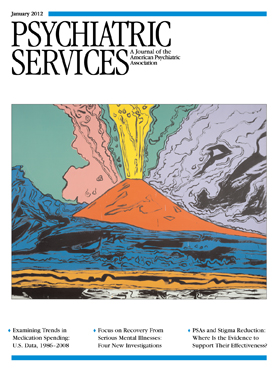Strengthening the Evidence Base to Support PSAs
In the Open Forum, Patrick Corrigan, Psy.D., highlights his views on a lack of empirical evidence in support of public service announcements (PSAs) against mental illness-related stigma and emphasizes the need to fund evaluation efforts in future PSA activities. Given the recent growth of social marketing campaigns and the opportunity costs in terms of other investments in mental health services, rigorous investigation to distill the most effective and efficient delivery of messages to mass groups is essential.
In developing a PSA evaluation, several research questions should be considered. PSAs can incorporate a range of communication strategies, messages, and target audiences, and PSA campaigns are executed in different ways. PSAs are diverse and should not be grouped together as a uniform intervention to be judged on the whole as either effective or ineffective. Evaluation of these efforts should carefully define the method of delivery, communication messages, and target groups in relation to impact. Such an approach will allow us to carefully identify the “active ingredients” associated with each specific PSA. Moreover, we need to evaluate the range of short-, medium-, and long-term impacts on the populations of interest.
To address these research questions, we are currently collecting data for a complex, independent evaluation of the Time to Change campaign. Time to Change, which began in 2008, is England's flagship national mental health campaign related to stigma and discrimination. As discussed by Corrigan, real-world impact is of utmost importance. And indeed we have adopted the approach of assessing knowledge, attitudes, and behavior—and we view behavior as the most important. We therefore focus on the impact on discrimination of the campaign components as well as on the content of the PSA communications. Specific a priori targets were established to measure such impacts. Therefore, in addition to measuring awareness of the campaign, our evaluation includes specific scales measuring the campaign's effects on mental health-related knowledge, attitudes, and behavior. A new scale also assesses mental health service users' experiences of discrimination.
Further, we are estimating the economic impact of changes associated with Time to Change. Notably, initial evaluation data suggest that between 2008 and 2009 there was a 4 percentage point increase in the proportion of people with mental health problems who experienced no discrimination (www.time-to-change.org.uk). Initial results also suggest a favorable change among senior executives at the organizations surveyed in regard to employing people with mental illness. National campaigns in New Zealand, Australia, Scotland, England, Norway, Sweden, and Denmark will further strengthen the evidence base on the effective active ingredients in such PSAs and allow us to be more specific and cost-effective in future PSAs that aim to reduce mental illness-related stigma and discrimination.



